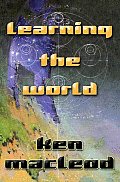Atomic Discourse Gale is a teenager, learning about possible careers, deciding what she wants to do with her life, and starting a popular blog. She lives on a space habitat which has been travelling for hundreds of years at sub-light speeds towards a star system to colonize. This has been done many times before in the history of humanity, and no one is expecting to find more than raw materials and maybe single-cell life.
Darvin is an astronomer at a time when comparison of photographic slides is just entering the common toolset. He also has a number of strange interests, such as mechanical flight, although those investigations take an abrupt second seat when he discovers a new, strangely-behaving astronomical object. Darvin also has wings and acts very much like a bat. (Well, okay, like a human with early 1900s technology and a smattering of bat-like characteristics.)
If this is starting to sound like Vernor Vinge's A Deepness in the Sky, well, you're not the only one with that feeling.
This isn't necessarily a bad thing; A Deepness in the Sky is a very good book. However, the first half of Learning the World is a lot like it, enough that I found the similarities distracting and a bit off-putting. MacLeod isn't stealing ideas or plot; the books do go very different places. But seeing a very, very human-like alien species with early industrial technology and noting the weird differences in their culture was amusing the first time and a little tedious the second time, particularly since MacLeod doesn't have Vinge's marvelous explanation for why the aliens were so human-like. I found myself wanting more action and plot than extrapolation of what the world might be like if people had wings and hung upside-down.
The second half of the book gets better. MacLeod finishes his introduction to the native culture and the plot heats up both on the ground and in space. Star-faring cultural norms set up a four-cornered fight with high stakes, and there is innate appeal in the gradual realization of the bats that the universe is far more than they expected and their whole world is going to change. But despite multiple good ideas, some nice set pieces, and engaging characters, Learning the World felt a bit empty and oddly flat.
One of the larger problems lies with MacLeod's choice of viewpoint. The hook is that all of the characters are re-learning the world: Atomic adapts to a world that contains aliens and fights over the best method of contact, Darvin awakes to a larger space-faring world outside of his planet and a new perspective on the less attractive aspects of his culture (such as their slave species), and Horrocks (another of the humans) learns about living in gravity. Unfortunately, MacLeod doesn't stick with those three viewpoints (already feeling like one too many for a short book). Several other humans get their turns in front of the camera to show all angles of the growing political and economic dispute, which gives the reader more information but leaves the perspective sadly fragmented. One feels more connection to the bats just because we always see Darvin's viewpoint, but the events in space have more conflict and excitement.
The book starts with a nice structural distinction. Atomic's viewpoint segments are written in the form of her blog entries, whereas Darvin's segments are traditional tight third-person perspective. I wish I could have read the book that followed only those two characters and maintained consistent viewpoints all the way through, even though it would have been tricky to tell some aspects of the story in space through only Atomic's viewpoint. I wanted to connect emotionally with Atomic, but she got so little screen time and character development that I felt informed of her emotions rather than seeing them. None of the other humans fare any better, and therefore the final resolution of the human's story lacks emotional punch.
Darvin, on the other hand, is a nice enough character, and I appreciate the point of how MacLeod had the bats handle their discovery, but the two didn't fit well together. Darvin is not a character who generates conflict on his own, and the resolution of the story on the ground, after moments of excitement, doesn't generate much drama. I was never sucked into the bats' story in its own right the way that I was sucked into the spiders' story in A Deepness in the Sky. The only hook was playing compare and contrast with human culture, which is amusing but not quite enough to hang half the book on.
This sounds rather negative, and I don't want to leave the impression this is a bad book. MacLeod is a competent writer: the story is well-paced, he alienates and reintroduces the reader to the familiar in the classic mode of SF, and the background is full of neat concepts and intriguing bits (such as the green human stars). The power play among the habitat residents is exciting and original once it starts happening. Readers who loved A Deepness in the Sky will probably enjoy this spin of similar ideas. I just can't shake some disappointment and a feeling the book could have been much better.
Reviewed: 2006-05-15
